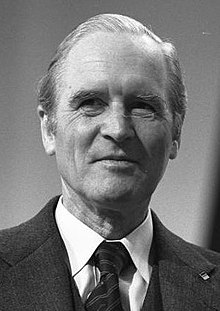Karl Carstens
Karl Walter Claus Carstens (14 December 1914 - 29 May 1992) was a German politician. He served as the fifth Federal President of West Germany.
Karl Carstens | |
|---|---|
 | |
| 5th President of the Federal Republic of Germany | |
| In office 1 July 1979 – 30 June 1984 | |
| Preceded by | Walter Scheel |
| Succeeded by | Richard von Weizsäcker |
| Personal details | |
| Born | 14 December 1914 |
| Died | May 30, 1992 (aged 77) |
| Nationality | German |
| Political party | CDU (since 1955); NSDAP (1940-1945) |
| Spouse(s) | Veronica Carstens |
Biography change
Born in Bremen, Carstens studied law and political science at the universities of Frankfurt am Main, Dijon, Munich, Königsberg, and Hamburg from 1933 to 1936. In 1949 he received a Master of Laws (LL.M.) degree from Yale Law School.
Carstens joined the Nazi Party in 1940. This was when he was a law clerk. He said he had to join the party or he would not be treated fairly. But this does not explain why Carstens had joined the SA, another Nazi party group, in 1933.
In 1955 he joined the CDU.
In July 1960 Carstens started to work for the government. He was a secretary of state in the Ministry of Foreign Affairs. In the same year he was also appointed as professor for public and international law at Cologne University. During the Grand coalition government (1966-1969), he was in the Ministry of Defence, and in 1968 he became Director of the Chancellor's Office.
In 1972 Carstens was elected into the Bundestag. He stayed a member until 1979. He often spoke against the left-wing ideas in German society and accused the governing SPD of being to soft on left-wing extremists. He also famously denounced the author Heinrich Böll as a supporter of the Baader-Meinhof Gang.
On 14 December 1976, the CDU/CSU became the largest group in parliament, and Carstens was elected president of the Bundestag.
On 23 May 1979 Carstens was elected as President of the Federal Republic of Germany. Carstens was well known for hiking around Germany during his term in order to decrease the gulf between politics and the people.
In December 1982, the recently elected Chancellor Helmut Kohl deliberately lost a motion of confidence in order to hold new general elections. On 7 January 1983, President Carstens dissolved the Bundestag and called for new elections. In February 1983 the Federal Constitutional Court said that deliberately losing the vote was allowed, so the general elections could take place.
In 1984 he decided not to seek a second term on account of his age and left office on 30 June 1984.
Literature change
- Michael F. Feldkamp (ed.), Der Bundestagspräsident. Amt - Funktion - Person. 16. Wahlperiode, München 2007, ISBN 978-3-7892-8201-0
| Preceded by Walter Scheel |
President of Germany 1979 – 1984 |
Succeeded by Richard von Weizsäcker |